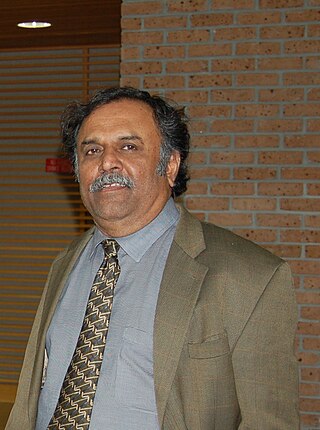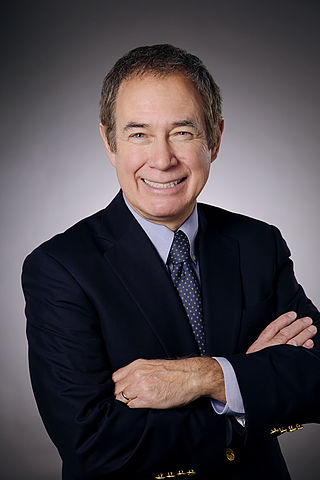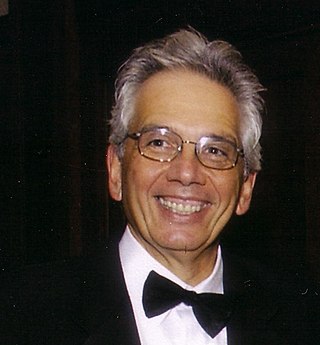Santa Clara University School of Engineering was founded and began offering bachelor's degrees in 1912. Over the next century, as the Santa Clara Valley transformed from a largely agricultural area to an industrial center, the school added master and doctoral programs designed to meet the area's growing need for expert engineers. Today, the Silicon Valley provides a setting for the school's programs offered through a broad range of departments.
Arun N. Netravali is an Indian–American computer engineer credited with contributions in digital technology including HDTV. He conducted research in digital compression, signal processing and other fields. Netravali was the ninth President of Bell Laboratories and has served as Lucent's Chief Technology Officer and Chief Network Architect. He received his undergraduate degree from IIT Bombay, India, and an M.S. and a Ph.D. from Rice University in Houston, Texas, all in electrical engineering. Several global universities, including the Ecole Polytechnique Federale in Lausanne, Switzerland, have honored him with honorary doctorates.

William Littell Everitt was a noted American electrical engineer, educator, and founding member of the National Academy of Engineering. He received his Ph.D. from Ohio State University in 1933. He was adviser of numerous outstanding scientists at OSU including Karl Spangenberg, and Nelson Wax. His PhD adviser was Frederic Columbus Blake.

Pramod P. Khargonekar is the Vice Chancellor for Research and Distinguished Professor of Electrical Engineering and Computer Science at the University of California, Irvine. An expert in control systems engineering, Dr. Khargonekar has served in a variety of administrative roles in academia and federal funding agencies. Most recently, he served as Assistant Director for Engineering at the National Science Foundation (2013-2016), and as Deputy Director for Technology at the Advanced Research Projects Agency – Energy. From 2001 through 2009 he was the Dean of the College of Engineering at the University of Florida.
Mustafa Tamer Başar is a control and game theorist who is the Swanlund Endowed Chair and Center for Advanced Study Professor of Electrical and Computer Engineering at the University of Illinois at Urbana-Champaign, USA. He is also the Director of the Center for Advanced Study.
Lee Swindlehurst is an electrical engineer who has made contributions in sensor array signal processing for radar and wireless communications, detection and estimation theory, and system identification, and has received many awards in these areas. He is currently a Professor of Electrical Engineering and Computer Science at the University of California at Irvine.
William Alden Edson was a scientist and engineer specializing in vacuum tube oscillators, radar, antennas and microwave technologies. His work spans universities, research institutions and commercial ventures. He taught at Illinois Institute of Technology, Georgia Institute of Technology and Stanford University.

Sundaraja Sitharama Iyengar is an Indian-born American computer scientist and the Distinguished University Professor, Ryder Professor and Director of Computer Science at Florida International University, Miami, Florida, USA. He also founded and directs the Robotics Research Laboratory at Louisiana State University (LSU). He has been a visiting professor or scientist at Oak Ridge National Laboratory, Jet Propulsion Laboratory, Naval Research Laboratory, and has been awarded the Satish Dhawan Visiting Chaired Professorship at the Indian Institute of Science, the Homi Bhaba Visiting Chaired Professor (IGCAR), and a professorship at the University of Paris (Sorbonne).
Walter David "Dave" Sincoskie was an American computer engineer. Sincoskie installed the first Ethernet local area network at Bellcore, and helped invent voice over IP technology. Sincoskie authored the first local ATM specification. He is also the inventor of the VLAN.
Bir Bhanu is the Marlan and Rosemary Bourns Endowed University of California Presidential Chair in Engineering, the Distinguished Professor of Electrical and Computer Engineering, and Cooperative Professor of Computer Science and Engineering, Mechanical Engineering and Bioengineering, at the Marlan and Rosemary Bourns College of Engineering at the University of California, Riverside (UCR). He is the first Founding Faculty of the Marlan and Rosemary Bourns College of Engineering at UCR and served as the Founding Chair of Electrical Engineering from 1/1991 to 6/1994 and the Founding Director of the Center for Research in Intelligent Systems (CRIS) from 4/1998 to 6/2019. He has been the director of Visualization and Intelligent Systems Laboratory (VISLab) at UCR since 1991. He was the Interim Chair of the Department of Bioengineering at UCR from 7/2014 to 6/2016. Additionally, he has been the Director of the NSF Integrative Graduate Education, Research and Training (IGERT) program in Video Bioinformatics at UC Riverside. Dr. Bhanu has been the principal investigator of various programs for NSF, DARPA, NASA, AFOSR, ONR, ARO and other agencies and industries in the areas of object/target recognition, learning and vision, image/video understanding, image/video databases with applications in security, defense, intelligence, biological and medical imaging and analysis, biometrics, autonomous navigation and industrial machine vision.
Bruce Eisenstein is an engineering educator serving as the Arthur J. Rowland Professor of Electrical and Computer Engineering. He was formerly Interim Dean and Vice Dean of the College of Engineering at Drexel University. He has published nearly 50 papers in the areas of digital signal processing, pattern recognition, deconvolution, along with biomedical engineering. He also served as president of the IEEE in 2000.

Chai Keong Toh is a Singaporean computer scientist, engineer, industry director, former VP/CTO and university professor. He is currently a Senior Fellow at the University of California Berkeley, USA. He was formerly Assistant Chief Executive of Infocomm Development Authority (IDA) Singapore. He has performed research on wireless ad hoc networks, mobile computing, Internet Protocols, and multimedia for over two decades. Toh's current research is focused on Internet-of-Things (IoT), architectures, platforms, and applications behind the development of smart cities.

Harold Vincent Poor FRS FREng is the Michael Henry Strater University Professor of Electrical Engineering at Princeton University, where he is also the Interim Dean of the School of Engineering and Applied Science. He is a specialist in wireless telecommunications, signal processing and information theory. He has received many honorary degrees and election to national academies. He was also President of IEEE Information Theory Society (1990). He is on the board of directors of the IEEE Foundation.

Paul R. Prucnal is an American electrical engineer. He is a professor of electrical engineering at Princeton University. He is best known for his seminal work in Neuromorphic Photonics, optical code division multiple access (OCDMA) and the invention of the terahertz optical asymmetric demultiplexor (TOAD). He is currently a fellow of IEEE for contributions to photonic switching and fiber-optic networks, Optical Society of America and National Academy of Inventors.
Dr. Hui Liu is a Chinese American professor and an entrepreneur in the field of wireless and satellite communications. He is a prolific researcher with more than 200 scholarly articles and 2 textbooks, and a creative innovator with 67 awarded patents in areas ranging from wireless systems, signal processing, satellite networks, to machine learning. He has more than 12,000 paper citations and an H-index of 56 as of 2018. Dr. Liu is also one of the principal designers of three industrial standards on cellular networks, terrestrial broadcasting, and satellite communications, respectively.
Charles Albert Zukowski is a professor and former chair of the Department of Electrical Engineering at Columbia University. Zukowski was born in Buffalo, New York. While still a student at MIT, from 1979 to 1982, Zukowski worked at the Thomas J. Watson Research Center. He received his BS in electrical engineering from the Massachusetts Institute of Technology in 1982. He received the IBM PhD Fellowship from 1982 to 1985; in 1985 he earned his PhD in electrical engineering with a thesis entitled "Design and measurement of a reconfigurable multi-microprocessor machine". The same year, he joined the faculty of Columbia University as assistant professor, and was awarded tenure in 1993. Zukowski is an active member of IEEE and was made an IEEE Fellow in 2000. Zukowski's present research focuses on VLSI circuits and integrated circuit (IC) optimization, though in the past he has published in the fields of systems biology and computer architecture.

Richard D. Gitlin is an electrical engineer, inventor, research executive, and academic whose principal places of employment were Bell Labs and the University of South Florida (USF). He is known for his work on digital subscriber line (DSL), multi-code CDMA, and smart MIMO antenna technology all while at Bell Labs.

Mark M. Tehranipoor is an Iranian American academic researcher specializing in hardware security and trust, electronics supply chain security, IoT security, and reliable and testable VLSI design. He is the Intel Charles E. Young Preeminence Endowed Professor in Cybersecurity at the University of Florida and serves as the Director of the Florida Institute for Cybersecurity Research. Since June 2022, he has served as the chair of the Department of Electrical and Computer Engineering at the University of Florida. He is a fellow of IEEE, ACM, and NAI as well as a Golden Core member of the IEEE. He is a co-founder of the International Symposium on Hardware Oriented Security and Trust (HOST). He is the recipient of the 2023 SRC Aristotle award. Tehranipoor also serves as a co-director of the Air Force Office of Scientific Research CYAN and MEST Centers of Excellence.

Chenzhong Li is a Chinese-born Canadian & American biomedical engineer, chemist, inventor, professor, and journal editor. Li is the co-Editor-in-Chief of the journal Biosensors and Bioelectronics (Elsevier) and the associate editors of journals RESEARCH (AAAS) and Biosensors (MDPI).









